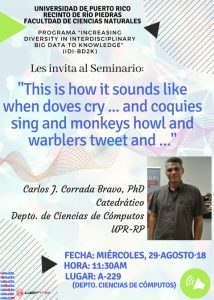Dr. Roche-Lima has been working on machine learning methods, based on kernels, to predict biological networks. He proposed a new framework, called Pairwise Rational Kernel (PRK), to manipulate sequence data represented as finite-state transducers (FSTs). By combining PRKs with supervised learning methods, biological network interactions have been predicted. As kernel methods are used, disparate type of data can be combined to find general relations. Using finite-state transducers, large amount of sequence data can be efficiently represented, processed and analyzed, improving the performance of the algorithms. Dr. Roche-Lima has been working and collaborating with bioinformatics studies at University of Manitoba, Canada, to predict biological interactions in several bacteria species. He is currently working at Medical Science Campus, University of Puerto Rico, where large volume of sequence data, from several projects, are being generated. Students in his lab will learn how to represent, manipulate and analyze these data using the existing frameworks and machine learning methods. As well, students will develop new computational tools using these techniques.
Due to his experience working with predicting models and biological sequence data, Dr. Roche-Lima brings to the project the ability to develop computational tools for analyzing and processing big sequence data. It can be used to predict biological network interactions, but also it can be extended to any other string data, such as text data in social network interactions.
